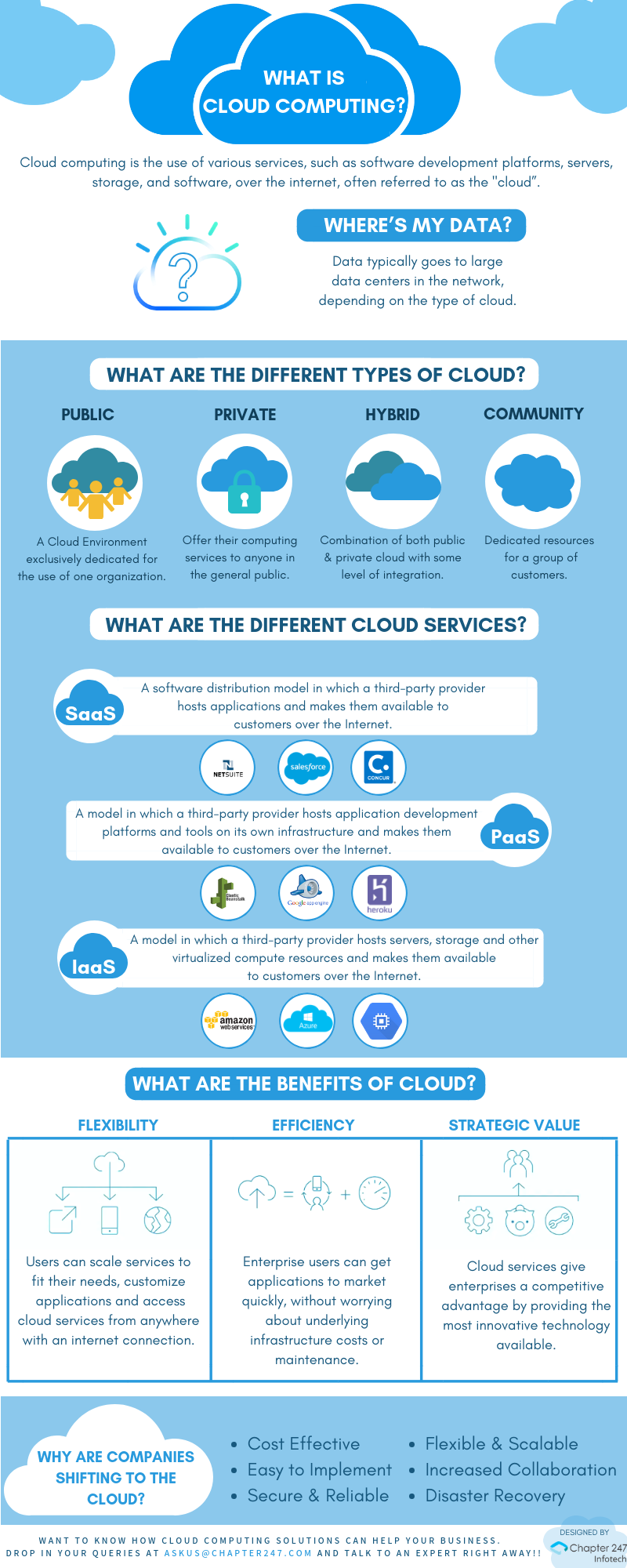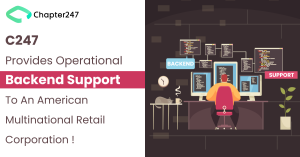So what is cloud computing?
What are the Types of Cloud Computing?
Basically, cloud computing is a way of outsourcing of computer programs such as software development platforms, servers, storage facilities over the Internet often referred as the Cloud. Using cloud computings users can access software and application over Internet. All of the programs are being hosted by an outside party and reside in the cloud, and works on the internet on a pay-for-use basis. As cloud computing has grown so rapidly, this have been categorized in several different models and deployment strategies, all based on specific needs of different users. Each type of deployment models and cloud services provides you with different levels of control, flexibility and management. Keep on reading through the article to know all the Types of Cloud Computing Services and deployment models which fit best as per your requirements.

Different Types Of Cloud Computing Deployment Models?
- Private cloud
A Cloud Environment exclusively dedicated for the use of one organization, which can be either managed internally or by a third party, similarly hosted either internally or externally. Private clouds can take advantage of cloud’s efficiency and provide more control of all the resources, maintaining a clarity of multi-tenancy. - Public cloud
Public clouds offer their cloud computing services over a public network, and the user have no physical control over the Cloud Infrastructure. By this we mean that the whole cloud computing infrastructure is located at the premises owned by any cloud computing company that offer cloud services. With public clouds users aren’t required to purchase any kind of hardware, software or supporting infrastructure which is owned and managed by providers. - Hybrid cloud
A Hybrid cloud is a combination of both private and public clouds, but with some level of Integrations based on their purpose. For example, public cloud can be used to interact with customers, while securing their personal data through a private cloud. Businesses can get more data deployment options and greater flexibility with the use of hybrid cloud. - Community cloud
A community cloud remains dedicated for a group of customers, usually with the shared data and data management concerns. For Example, A community cloud can be dedicated to a government of a single country or state, and can be located at both on and off the premises.

Different Types of Cloud Computing Services?
- Software as a Service
A cloud computing service model in which all the applications are hosted by a third-party provider and makes them accessible to customers over the Internet.
Example: Salesforce, NetSuite and Concur- The benefits of SaaS
i) Any user can sign up and rapidly start using exclusive business apps as per his/her needs.
ii) You can access all the data and apps from any connected computer.
iii) No loss of data in case of any damage to your computer, as the data is in the cloud.
- The benefits of SaaS
- Platform as a Service
A cloud computing service model in which an Application Development Platform and all the relevant tools are hosted by a third-party provider on its own Infrastructure and makes them available to customers over the Internet.
Example: AWS Elastic Beanstalk, Google App Engine, Heroku- The benefits of PaaS:
i) You can develop applications faster and market the same in a short span of time.
ii) New web application to the cloud can be deployed in minutes.
iii) Helps in reducing the complexity with middleware as a service.
- The benefits of PaaS:
- Infrastructure as a Service
A cloud computing model in which a third-party provider hosts servers, storage and other virtualized compute resources, and makes them accessible over the Internet.
Example: AWS, Microsoft Azure, Google Compute Engine- The benefits of IaaS
i) Zero investment in setting up your own cloud computing infrastructure hardware.
ii) Infrastructure can be scaled on demand to support dynamic workloads.
iii) On demand Flexible and Innovative services available.
- The benefits of IaaS

What are the Benefits of the Cloud?
- Flexibility
Users can scale services to fit their needs, customize applications and access cloud services from anywhere with an internet connection. - Efficiency
Enterprise users can get applications to market quickly, without worrying about underlying infrastructure costs or maintenance. - Strategic value
Cloud services give enterprises a competitive advantage by providing the most innovative technology available.
Why are companies shifting to the cloud?
- Cost Effective
- Easy to Implement
- Secure & Reliable
- Flexible & Scalable
- Loss Prevention & Disaster Recovery
- Increased Collaboration
How Chapter247 Infotech can help you to Shift your business to the Cloud?
As you already went through all the facts on how Cloud Computing is transforming the way businesses can manage their IT Infrastructure and requirements with Cloud. In order to achieve hard and soft cost savings in the short and long term, businesses can move all of their portions of workloads into the cloud. Similar to many other businesses you might be also thinking that it’s too difficult to even test the waters because of the difficulty in moving your legacy IT services and Infrastructures to the Cloud. Chapter247 changes all that by digging out all the risks out of the equation. Chapter247 provides you with Cloud Computing services to make it easy, quick and secure to move almost any Legacy IT Infrastructure to the cloud. Thereby bringing in the benefits of the Cloud to enhance your business possibilities with minimal time, complexity and cost.
Want to know how cloud computing solutions can help your business. Drop in your queries at askus@chapter247.com and talk to our cloud expert right away!!







